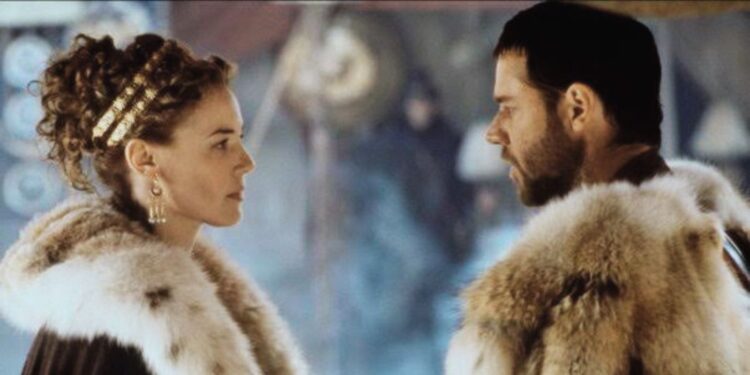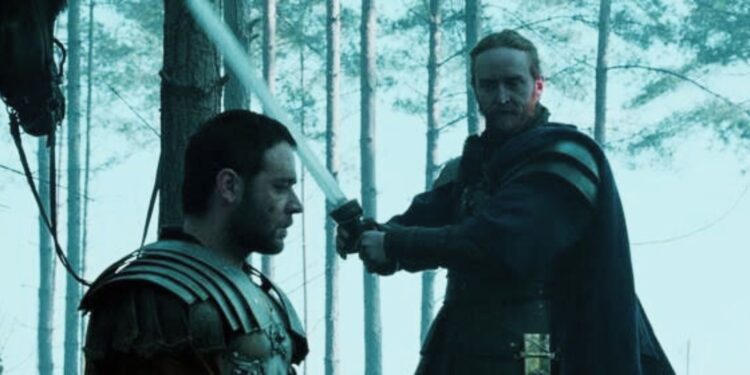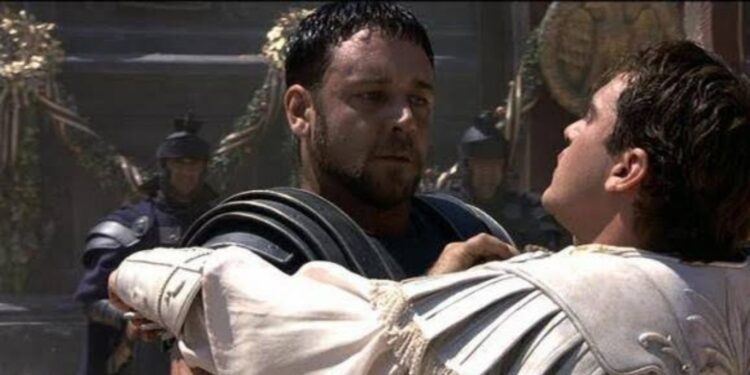When Walter F. Parkes and Douglas Wick approached Ridley Scott to direct Gladiator, Scott was almost immediately sold for one reason. The producers presented Scott with a copy of the 1872 Pollice Verso (Thumbs Down) by Jean-Léon Gérôme, and the idea of filming an ancient Roman Empire movie caught Scott’s attention. However, Scott made it clear from the onset he had no interest in making stereotypical Roman Empire movies. Nevertheless, the inspiration behind Gladiator came from older movies.
The first thing Scott sought to change was David Frazoni‘s dialogue in his original speech. To help build Gladiator‘s screenplay, Scott and Frazoni drew influences from older popular Roman Empire movies like Ben-Hur (1959), Spartacus (1960), and The Fall of the Roman Empire (1964). As such, Gladiator and the other movies have similarities in plots and characters.
Gladiator Kept Marcus Aurelius’ Chosen Successor The Same

Gladiator shares a similar plot with Anthony Mann‘s epic historical drama, The Fall of the Roman Empire. Just as Maximus Decimus Meridius is Gladiator’s main protagonist, Gaius Livius is the protagonist in The Fall of the Roman Empire. When Marcus Aurelius was looking to name a successor, in both movies, he refused to name his son Commodus. He chooses Livius in The Fall of the Roman Empire and Maximus in Gladiator.
Gladiator Changed Maximus’s Relationship With Lucilla

One of John Logan‘s earliest changes to Frazoni’s script was killing off Maximus’ family. Logan believed it made Maximus’ motivation for revenge more relatable. The only similarity both movies had about Maximus and Lucilla’s relationship is that they were close. Gladiator hints at an attraction, making Maximus Lucilla’s love interest. However, Maximus is married with a son, and the movie’s revenge plot indicates his commitment to his family.
On the other hand, in The Fall of the Roman Empire, Livius is openly in love with Lucilla. Marcus Aurelius’ death creates events that led to Commodus marrying off his sister, Lucilla, to Sohaemus, King of Armenia. At the end of the movie, Livius is reunited with Lucilla, and they both walk away from the impending madness that would consume Rome.
Gladiator Changed How Marcus Aurelius Was Killed

Marcus Aurelius is assassinated in Gladiator and The Fall of the Roman Empire. Gladiator‘s Marcus Aurelius assassination is done by his son, Commodus, who suffocates his father in a cold-hearted embrace. The action’s intensity was reportedly so overwhelming that Joaquin Phoenix was said to have passed out after shooting the scene.
In The Fall of the Roman Empire, Marcus Aurelius is poisoned by Commodus’ companions without his knowledge. Aware that Aurelius planned to name Livius his successor, they plotted to kill him before he made his choice public. Marcus Aurelius was killed to protect their political interests and the benefits of having a friend (Commodus) as Emperor.
The consequence For Refusing To Ally With Commodus Is Changed In Gladiator

Maximus’ refusal to serve Commodus in Gladiator forms the basis for the film’s plot. Aware of his father’s chosen successor (Maximus), Commodus decides to kill Maximus when he refuses to ally with him. Not only does he order Maximus’ death, but Commodus also sends a squad to kill Maximus’ wife and son.
In The Fall of the Roman Empire, Livius is Commodus’ closest friend. Although Livius is aware he was Marcus Aurelius’ choice for Emperor, he refuses any plot to honor Aurelius’ wishes and allows Commodus to take the throne. Livius continues to serve under Commodus as General, even helping Commodus defeat the Germans.
Gladiator Kept Commodus’ Killer The Same

“The time for honoring yourself will soon be at an end.” True to his words, Maximus kills Commodus in the arena. Although the main protagonist of each movie kills Commodus in a fight, the location of the fight and the events leading to it differ. In The Fall of the Roman Empire, Livius and Lucilla are sentenced to death by burning. In a last act of mercy, Commodus offers to duel Livius for the throne. The fight is held at the Roman Forum with Livius and Commodus armed with javelins. Impaled with the javelin, Livius kills Commodus. Commodus’ fate is sealed in Gladiator and The Fall of the Roman Empire.
 Follow Us
Follow Us




